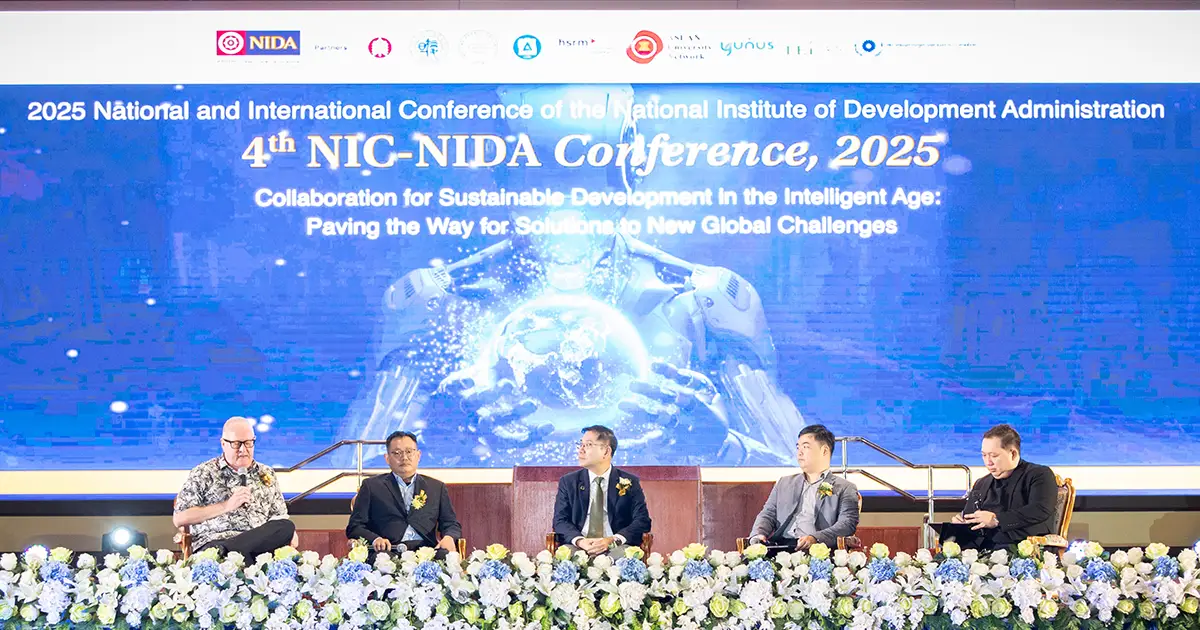by
Prof. Richard Welford, Ph.D., Director of ERP Environment and NIDA Visiting Professor
Prof. Ming-Lang Tseng, Ph.D., Asia University
Assoc. Prof. Haoqi Qian, Ph.D., Fudan University
Assoc. Prof. Sarawut Jansuwan, Ph.D., Smart City Center, NIDA
Panel Chair: Thanachart Ritbumroong, Ph.D., NIDA
Summary of panel discussion highlights by
Asst. Prof. Thitat Chavisschinda, Ph.D.
In an era defined by intelligent systems and global interdependence, the NIC-NIDA International Conference 2025 convened a pivotal panel discussion on Smart Infrastructure and Inclusive Industrialization. The session brought together leading scholars and practitioners to explore how innovation, equity, and governance can converge to shape resilient and sustainable societies.
Moderated by Dr. Thanachart Ritbumroong, the panel featured Prof. Richard Welford, Ph.D. (ERP Environment and NIDA Visiting Professor), Prof. Ming-Lang Tseng, Ph.D. (Asia University), Assoc. Prof. Haoqi Qian, Ph.D. (Fudan University), and Assoc. Prof. Sarawut Jansuwan, Ph.D. (Smart City Center, NIDA). Their dialogue unfolded as a strategic roadmap—one that challenges conventional development models and reimagines infrastructure as a tool for inclusion and transformation.
Rethinking Infrastructure: From Technology to Values
Prof. Richard Welford opened with a provocative critique of the private sector’s role in sustainability. He argued that smart infrastructure must be more than a technological upgrade—it must reflect a deeper commitment to long-term value, ethical innovation, and environmental stewardship. Welford warned against the unchecked rise of artificial intelligence, urging stakeholders to consider its societal implications. His call for systemic reform—through green bonds, pension fund engagement, and ESG integration—set the tone for a conversation that transcended technical discourse.
Prof. Ming-Lang Tseng built on this foundation by introducing a multi-level framework that links smart infrastructure with circular economy principles. Drawing from his research on ESG and lifecycle assessment, Tseng emphasized the role of real-time data and IoT technologies in enabling low-carbon manufacturing and resilient supply chains. He positioned academic research as a catalyst for policy innovation, stressing that inclusive industrialization requires coordinated action across firms, sectors, and governments.
Assoc. Prof. Haoqi Qian offered a regional lens, sharing insights from China’s “new infrastructure” strategy. He highlighted strategic investments in 5G, AI, and ultra-high voltage transmission—not as ends in themselves, but as vehicles for green transition and social inclusion. Qian advocated for policy-driven change, proposing that governments embed social indicators into infrastructure evaluation to ensure equitable outcomes. His remarks underscored the importance of long-term incentives and institutional alignment in achieving sustainability goals.
Assoc. Prof. Sarawut Jansuwan grounded the discussion in local practice, presenting NIDA’s Smart City Center as a living laboratory for urban innovation. He detailed initiatives such as IoT-based energy monitoring, digital twin modeling, and green space optimization—implemented on NIDA’s campus to demonstrate scalable solutions. Jansuwan emphasized the role of community engagement, introducing virtual training platforms that empower citizens to co-design their urban environments. His vision for net-zero energy buildings reflects a commitment to high-efficiency systems and renewable integration.
Strategic Themes: What the Dialogue Revealed
The panel discussion surfaced five interrelated strategic themes that collectively redefine how smart infrastructure and inclusive industrialization should be conceptualized and implemented in the intelligent age.
First, the conversation emphasized the imperative to move beyond technology. While digital tools and automation are central to infrastructure modernization, the panelists argued that true progress must be anchored in values—particularly equity, sustainability, and long-term thinking. Smart systems must not only optimize efficiency but also reflect ethical priorities and social responsibility.
Second, the theme of collaborative governance emerged as a cornerstone of inclusive industrialization. The panel underscored that no single sector can drive transformation alone. Instead, meaningful progress requires structured collaboration among public institutions, private enterprises, and academic bodies. These actors must share responsibility, align their visions, and co-create solutions that are both technically sound and socially inclusive.
Third, the panel challenged conventional development metrics, advocating for metrics that matter. Economic output alone is insufficient to capture the complexity of sustainable development. Instead, success should be measured through indicators such as community resilience, individual well-being, and the strength of social capital. These multidimensional metrics offer a more accurate reflection of societal progress and inclusivity.
Fourth, the principle of inclusive design was highlighted as essential to equitable infrastructure development. Panelists stressed that infrastructure must serve all communities, especially those historically marginalized or underserved. Inclusion must be embedded not only in outcomes but also in processes—ensuring that diverse voices are actively involved in planning, decision-making, and evaluation.
Finally, the discussion pointed to the need for policy innovation. Governments must adopt flexible and coherent policy frameworks that encourage experimentation, support cross-sectoral coordination, and align with global sustainability goals. Such policies should be adaptive to emerging challenges while remaining grounded in principles of justice and long-term resilience.
Conclusion: A Call to Action
The panel concluded with a shared recognition that smart infrastructure and inclusive industrialization are not technical challenges alone—they are strategic imperatives. Institutions like NIDA are uniquely positioned to lead this transformation, serving as conveners, innovators, and educators in the pursuit of sustainable futures. As the intelligent age accelerates, the insights from this panel offer more than reflection—they offer direction. By investing in research, fostering collaboration, and engaging communities, Thailand can build infrastructure that empowers, industry that includes, and development that uplifts.
The NIDA Research Bureau is proud to share this synthesis as part of its commitment to advancing knowledge, dialogue, and action for a more sustainable and inclusive world.




